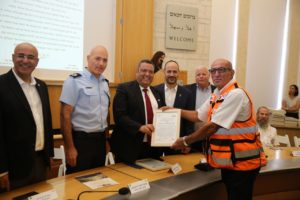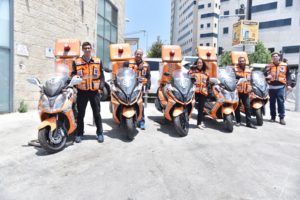Sami Darwish had just returned home from prayers at Al-Aqsa Mosque in Jerusalem when a fateful series of events turned an otherwise peaceful afternoon into a close call with death.
The 60-year-old medic from the east Jerusalem neighborhood of Sharafat has been a volunteer ambulance driver at United Hatzalah, Israel’s largest non-profit independent emergency medical service, since 2008.
At around 3 pm on the last Friday of Ramadan, Darwish was standing outside his home in Sharafat when he said he saw a white van begin driving around the neighborhood.
“There were two young men inside with a megaphone yelling out insults and unspeakable curses in Arabic,” Darwish told The Media Line. “They were driving around the area and I went to see what they were doing. I stood close to the car and they almost ran me over and insulted me.”
Though the rabble-rousers, whom Darwish described as being Orthodox Jews in appearance, did eventually leave without any further altercations, residents of Sharafat were shaken. The incident occurred against the backdrop of a flare-up in Arab-Jewish violence across the country, which had seen lynching attempts, riots and clashes with police.
We’ve had almost double the amount of calls over the last month daily than we have previously
After the van left, Darwish said, everyone in his neighborhood “was awake and keeping an eye out.”
“It was a holy day: the last Friday of Ramadan,” he said. “What brought these people here to our neighborhood? Why did this car come by and who helped them? Why didn’t the police do anything?”
Unfortunately, the story did not end peacefully.
Several hours later, an ultra-Orthodox Jewish man passed through the same area.
Thinking he was somehow connected to the Jewish extremists from earlier in the day, Arab residents suddenly crowded around the Jewish man and began attacking him. Had Darwish not intervened in time, the man – whose identity has not been revealed – might have ended up getting killed.
“He was innocent and had nothing to do with what had happened before,” Darwish said. “I took the man and brought him away to a safe place to save his life.”
One of the reasons Darwish joined United Hatzalah was due to a lack of efficient first response services in Arab areas.
“Jewish ambulance drivers don’t know those areas very well,” he explained. “This means that when we call an ambulance it takes a long time for it to arrive.”

Sami Darwish, seen in 2019 receiving an award from Jerusalem Mayor Moshe Lion for his work in saving lives. (Shira Hershkop/Courtesy)
Through weeks of riots, rockets and civil unrest, United Hatzalah’s medical emergency service has emerged as a beacon of coexistence. The organization relies on a nationwide network made up of thousands of volunteer EMTs, paramedics and doctors to provide life-saving first response care.
“We’ve had almost double the amount of calls over the last month daily than we have previously,” Raphael Poch, international media spokesperson of United Hatzalah, told The Media Line. “Usually, we have about 1,800 calls in a day … since the end of Ramadan when the violence was getting really heavy, the calls spiked to about 3,000.”
When they receive an emergency alert from the organization’s national dispatch center, volunteer first responders drop everything and rush to help save lives. In urban areas, the average response time is 90 seconds thanks to a fleet of ambucycles that can easily weave in and out of traffic.
“United Hatzalah takes pride in having over 6,000 volunteers from all walks of life,” Gavy Friedson, director of International Emergency Management at United Hatzalah, told The Media Line. “Jews, Christians, Druze, Muslims: Literally anybody who wants to volunteer has a place here as long as they’re qualified and take the course to become either an EMT or a paramedic.”
About 10% of the organization’s volunteers are Muslim.
United Hatzalah takes pride in having over 6,000 volunteers from all walks of life
Khaled Rishek, who hails from the mixed Jerusalem neighborhood of Abu Tor, is one of them.
The 54-year-old father of four, who joined United Hatzalah some 13 years ago, described the recent uptick in violence across Jerusalem as being among the “toughest periods” he had ever witnessed in the city.
“We had many calls to respond to, especially in the Sheikh Jarrah neighborhood, Al-Aqsa Mosque and Damascus Gate areas, as well as during the [Jewish holiday] of Shavuot, where we also had the regrettable incident in Givat Ze’ev when the bleacher collapsed,” Rishek told The Media Line, referring to an incident that took place two weeks ago.
On the eve of Shavuot, two people were killed and an additional 184 injured when newly installed bleachers in a Hassidic synagogue in Givat Ze’ev collapsed during holiday prayers. Since observant Jews do not answer their phones or use electrical appliances over religious holidays, many Muslim first responders from United Hatzalah took the lead in treating those injured and alerting their loved ones.

United Hatzalah includes volunteers from all walks of life. (Courtesy)
Likewise, Rishek also has seen his fair share of injured people in the east Jerusalem neighborhood of Sheikh Jarrah, which has been the site of protests over planned evictions of Palestinian families.
“In Sheikh Jarrah, I helped a Jewish man who was hurt after getting hit in the head with a stone,” Rishek recounted. “We evacuated him from there with a head injury. I gave him life-saving primary care. I also helped Palestinians who were shot with rubber bullets and beaten by police.
“United Hatzalah is a very important organization for us because it responds to and connects people, regardless of their faith, race or gender,” he added.
Despite the unpredictable nature of being a first responder and the risks associated with working under fire, United Hatzalah has become an inextricable part of Israel’s wider emergency response system, especially in times of war and civil unrest. In fact, the organization says it has treated over four million people across Israel since 2006.
“It takes a certain type of person to go out and drop whatever it is you’re doing and rush out to save someone you don’t know, but the amount of satisfaction that you get from doing that and from knowing you’ve helped, knowing you’ve saved a life – it’s incomparable to any other feeling in the world,” Poch said.